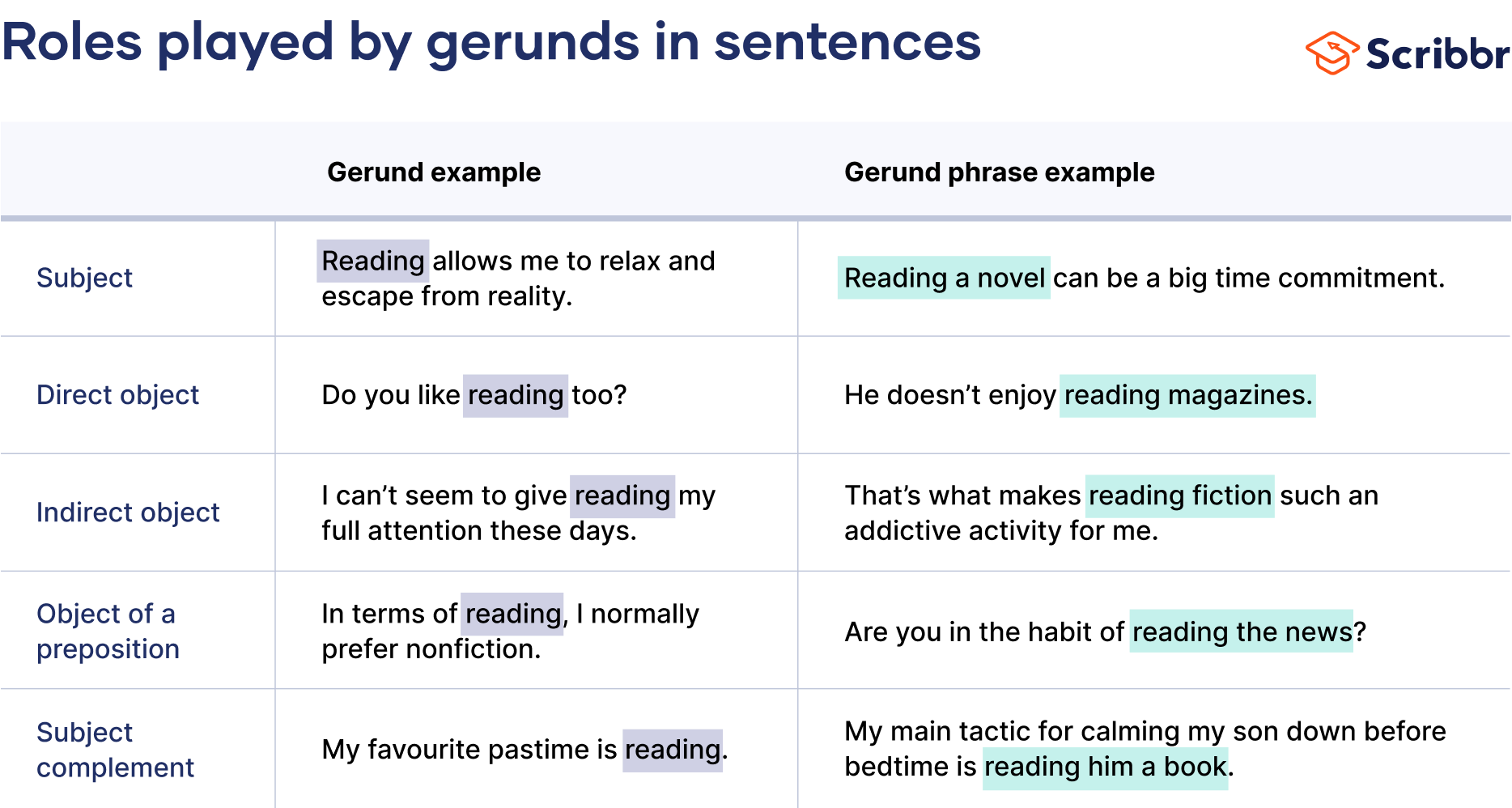Gerund | Definition, Form & Examples
A gerund is a word like ‘swimming’ in the sentence ‘I have always enjoyed swimming’. The term refers to the ‘-ing’ form of a verb when it functions as a noun.
A gerund usually refers in a general way to the activity represented by the verb it’s derived from. Above, ‘swimming’ means the activity of swimming in general, not a specific instance of swimming.
Gerunds are different from other nouns in that they can be modified by adverbials (e.g., ‘I enjoy swimming in the sea‘) and can take direct objects (e.g., ‘playing my guitar always relaxes me’).
I’m in the habit of writing every day.
Meditating helps Shirley to clear her mind.
How are gerunds used in sentences?
A gerund is used in the same way as other types of nouns.
That means it can serve as the subject of a sentence, followed by a verb; as a direct object (thing directly acted on by a verb) or indirect object (thing that receives the direct object); or as a subject complement (joined to the subject by a linking verb).
Gerund phrase
A gerund phrase is the whole phrase headed by a gerund, including anything that modifies it. A gerund phrase can consist of the gerund on its own or in combination with one or more adverbials, a direct object, an indirect object, or all of the above. It’s a type of noun phrase.
Present participle vs gerund
Gerunds are always identical to present participles, which are also formed by adding ‘-ing’ to the infinitive form of a verb. The difference concerns the role the words play in sentences:
- Gerunds are used as nouns.
- Present participles are used as adjectives and to form the continuous verb tenses.
I had to help a crying girl who had lost her mother. She had been crying for a little while.
Gerund form
The gerund form of a verb, like the present participle, is formed by adding ‘-ing’ to the infinitive form of the verb. For example, the infinitive ‘fly’ creates the gerund ‘flying’.
Some gerunds are formed slightly differently. For example, ‘lie’ becomes ‘lying’, replacing ‘ie’ with ‘y’; ‘run’ becomes ‘running’, doubling the ‘n’. If you’re unsure how to spell a particular gerund, check a dictionary.
- In UK English, they are typically formed by doubling the ‘l’ and adding ‘-ing’ (e.g., ‘model’ becomes ‘modelling‘).
- In US English, the ‘l’ is doubled only when the final syllable is stressed (e.g., ‘control’ becomes ‘controlling’, but ‘model’ becomes ‘modeling’).
Gerunds and infinitives
Gerunds are often used interchangeably with the ‘to’ infinitive form of a verb (e.g., ‘I like singing‘/’I like to sing‘). However, they are not always interchangeable and, where both can be used, they often differ in tone and meaning.
The use of a ‘to’ infinitive as a subject is possible but tends to sound unnatural. It’s normally better to use a gerund.
- To bake is my favorite hobby.
- Baking is my favorite hobby.
When a ‘to’ infinitive acts as an adjective, it can’t be replaced with a gerund.
- Are there any games to play?
- Are there any games playing?
Some transitive verbs (such as ‘plan’, ‘decide’, and ‘forget’) can be followed by a ‘to’ infinitive but not a gerund. These verbs tend to connote something potential or that hasn’t happened yet.
- I forgot paying my gas bill.
- I forgot to pay my gas bill.
A ‘to’ infinitive normally can’t be preceded by another preposition, whereas a gerund can.
- Special equipment and training are needed for to climb.
- Special equipment and training are needed for climbing.
Should I use a possessive before a gerund?
Language authorities usually argue that a sentence like ‘If me being here bothers you, I’ll leave’ is incorrect. The problem is the use of the object pronoun ‘me’ before the gerund ‘being’. The correct phrasing uses a possessive determiner: ‘my being here’.
The wrongness of the first phrasing is obvious if you use a different noun, ‘presence’, in place of the gerund: ‘If me presence bothers you’ doesn’t sound right at all. The possessive ‘my’ is clearly needed.
The possessive in this context is nevertheless considered quite formal and has largely been replaced with the object pronoun in informal conversation. But we recommend using a possessive noun or determiner in formal contexts such as academic writing.
Mark’s coming home late worried his parents.
It would be illogical to say ‘the woman’s staring’ in this context, because it was obviously the woman who spoke, not her action of staring.
Exception: ‘-ing’ words as verbal nouns
‘-ing’ words that are used as nouns sometimes don’t technically function as gerunds. In their non-gerund use, they’re often called verbal nouns, but the terminology varies: sometimes gerunds are considered a type of verbal noun, sometimes a separate category.
The difference between these nouns and true gerunds is that, unlike gerunds, they don’t have the ability to be modified by adverbs or take objects. They can also be pluralised.
Think of words like ‘painting’, ‘killing’, and ‘building’: when they describe an activity, they function as gerunds, but when they describe a physical object or individual event, they are verbal nouns without the gerund’s usual ability to be modified by adverbs and take objects.
My favorite paintings were located in the wing of the building dedicated to modern art.
Frequently asked questions
Sources for this article
We strongly encourage students to use sources in their work. You can cite our article (APA Style) or take a deep dive into the articles below.
This Scribbr articleCaulfield, J. (2023, May 01). Gerund | Definition, Form & Examples. Scribbr. Retrieved 22 December 2025, from https://www.scribbr.co.uk/nouns/gerunds/
Aarts, B. (2011). Oxford modern English grammar. Oxford University Press.
Butterfield, J. (Ed.). (2015). Fowler’s dictionary of modern English usage (4th ed.). Oxford University Press.
Garner, B. A. (2016). Garner’s modern English usage (4th ed.). Oxford University Press.




